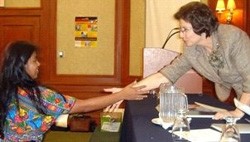
Women’s legal rights have had little understanding and respect throughout Guatemala. Indigenous women, in particular, who represent more than 25 percent of the population, have suffered from an ongoing culture of violence, oppression, and discrimination. This situation is changing due to reforms that Guatemalan society and authorities are fostering under the framework of the 1996 Peace Accords.
Among those supporting the accords include a USAID women’s legal rights initiative that works with all branches of the judicial sector, including the Supreme Court, to train legal professionals and civil society advocates to understand women’s legal rights.
In August 2006, the program sponsored the first visit of a U.S. federal judge to Guatemala. Judge Diane P. Wood held a series of conferences on women’s rights in the United States, the U.S. Federal judicial system, and judicial independence attended by over 700 legal professionals.
This conference series prompted the development and signing of a memorandum of understanding between the project and Supreme Court Justice Beatriz De León de Barreda, the first woman ever elected president of Guatemala’s Supreme Court. Through the memorandum, De León launched a strategic public awareness campaign to train justice officials in confronting gender-based violence and ensuring women’s access to justice. Seventy participants from Ixcán, Playa Grande, El Quiché, and staff from 60 mediation centers received the training. These centers are critical because they reach people at the community level and are often the first source of information, particularly for women victims of violence.
De León also created a gender unit within the Supreme Court. The unit, the first of its kind, will take the lead on all gender-related activities within the country’s judicial sector. Through De León’s efforts, women’s legal rights have been placed on the agenda of the Guatemala Supreme Court and solidified the country’s commitment to dealing with violence against women.







Comment
Make a general inquiry or suggest an improvement.